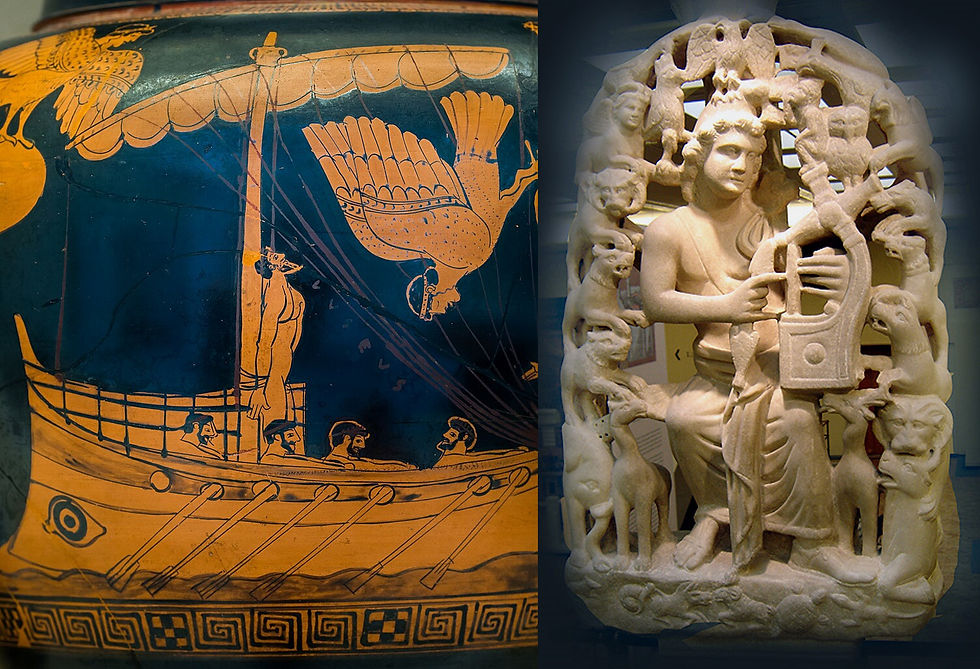Seven-Day Practical Faith Blog: The Positive Goodness of the Master
- cecil2748
- Aug 9, 2024
- 2 min read

My entire viewpoint on the Fruit of the Spirit called goodness changed when I read this quote years ago by Harry Emerson Fosdick, from his book "The Manhood of the Master."
When Ulysses (Odysseus) passed the Isle of Sirens, he had himself tied to the mast and had his ears stopped with wax, that he might not hear the sirens singing - a picture of many a man's pitiful attempts after negative goodness. But when Orpheus passed the Isle of Sirens, he sat on the deck, indifferent, for he too was a musician and could make melody so much more beautiful than the sirens, that their allurings were to him discords. Such is the Master's life of positive goodness, so full, so glad, so triumphant, that it conquered sin by surpassing it.
This set me on an exploration of negative goodness vs. positive goodness, trying to answer the question: Is goodness the absence of bad or the presence of good?
When we inspect Jesus's life and teachings, we must come to the conclusion that goodness is the presence of good. Jesus had a problem with the Pharisees' approach to religion. They were concerned more with not doing wicked things than they were with doing good things. The Pharisees laid out a path of narrow stepping stones to keep their feet upon (such as "do no work on the Sabbath"), when positive goodness calls us to get off the path to help others (such as "heal and help others even on the Sabbath").
Jesus didn't want us to be satisfied with negative goodness.
He didn't stop at "don't kill," but urged us to foster good relationships and to not kill reputations (Matthew 5:21-26).
Jesus pointed out that it was still possible to lust even if we don't commit adultery (Matthew 5:27-30).
He took away our reason to covet our neighbors' possessions by pointing us to the supremacy of heavenly treasures (Matthew 6:19-21).
Ultimately, Jesus summed up positive goodness in the Golden Rule (Matthew 7:12): "Do unto others as you would have them do unto you." Prior religions and philosophers had stated this principle in the negative: "Don't do to others what you wouldn't have done to yourself." But Jesus pushes us farther than "do no harm" into "do good" - the truest comparison of negative goodness vs. positive goodness.
If we are to exhibit the Fruit of the Spirit called goodness, we must actually do good. The Holy Spirit helps us, reminding our conscience of the necessity to do good and spurring us to action. If we live with the Spirit and listen to the Spirit, we'll find ourselves leaving the prim stepping stones of negative goodness and pursuing messy, inconvenient lives because we're giving so much goodness for God and to our neighbors.
LOVE CONNECTION: In connecting goodness to the supreme fruit of love, it's easy to see that if we are proactively doing good for others, our love becomes evident. Goodness gives concrete validity to the aspiration of love.
The Ulysses photo is provided by ArchaiOptix through the Creative Commons Attribution Share-Alike 4.0 license. The Orpheus photo is provided by Ricardo Andre Franz through the Creative Commons Attribution Share-Alike 3.0 Unported license.
Here are the links to the Creative Commons licenses: https://creativecommons.org/licenses/by-sa/3.0/ and https://creativecommons.org/licenses/by-sa/4.0/




Comments